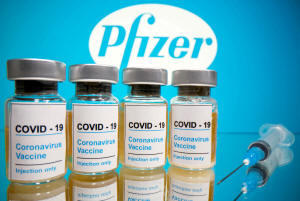Pfizer files COVID-19 vaccine application to U.S. FDA
 Send a link to a friend
Send a link to a friend
 [November 21, 2020]
By Vishwadha Chander [November 21, 2020]
By Vishwadha Chander
(Reuters) - Pfizer Inc <PFE.N> applied to
U.S. health regulators on Friday for emergency use authorization (EUA)
of its COVID-19 vaccine, the first such application in a major step
toward providing protection against the new coronavirus.
The application to the U.S. Food and Drug Administration (FDA) comes
just days after Pfizer and German partner BioNTech SE <22UAy.DE> <BNTX.O>
reported final trial results that showed the vaccine was 95% effective
in preventing COVID-19 with no major safety concerns.
Pfizer Chief Executive Officer Albert Bourla confirmed the application
had been made in a video posted on the company's website on Friday
afternoon.
The FDA said on Friday it would hold a meeting of the advisory committee
on Dec. 10 at which members would discuss the vaccine. The agency
declined to predict how long its review would take, although both Pfizer
and U.S. Health Secretary Alex Azar have said the FDA could authorize
the vaccine in mid-December.

Pfizer's shares closed up 1.4% and BioNTech shares ended 9.6% higher in
New York, as the possibility of a vaccine soon raised hopes for the end
of a pandemic that has claimed more than a quarter of a million lives in
the United States and over 1.3 million worldwide.
For an interactive graphic tracking the global spread of COVID-19, open
https://graphics.reuters.com/world-coronavirus-tracker-and-maps/ in an
external browser.
The application also includes safety data on about 100 children 12-15
years of age. The company said 45% of U.S. trial participants are 56-85
years old.
If the data is solid, "we literally could be weeks away from the
authorization of a 95% effective vaccine," Azar said on CBS's "This
Morning."
The companies expect the FDA to grant the EUA by mid-December and said
they will begin shipping doses almost immediately. Pfizer has said it
expects to have 50 million vaccine doses ready this year, enough to
protect 25 million people.

The final trial data showed the vaccine provided a similar level of
protection across different ages and ethnicities - an encouraging result
as the disease disproportionately hurts the elderly and minorities.
[to top of second column]
|

Vials with a sticker reading, "COVID-19 / Coronavirus vaccine /
Injection only" and a medical syringe are seen in front of a
displayed Pfizer logo in this illustration taken October 31, 2020.
REUTERS/Dado Ruvic/File Photo

Of the 170 volunteers who contracted COVID-19 in Pfizer's trial
involving over 43,000 people, 162 had received only a placebo,
meaning the vaccine was 95% effective, far higher than originally
expected. The U.S. FDA had set minimum bar for efficacy of 50%.
Pfizer said nearly 42% of global participants and 30% of U.S.
participants in the Phase 3 study have racially and ethnically
diverse backgrounds.
"Filing in the U.S. represents a critical milestone in our journey
to deliver a COVID-19 vaccine to the world and we now have a more
complete picture of both the efficacy and safety profile of our
vaccine," Bourla said in a statement.
Moderna Inc <MRNA.O> is expected to be the next company to seek a
U.S. emergency use nod for a COVID-19 vaccine. An initial analysis
of data from its late-stage trial showed the vaccine was 94.5%
effective. Final results and safety data are expected in the coming
days or weeks.
Both the Pfizer/BioNTech and Moderna vaccines work using a new
technology to trigger an immune response known as synthetic
messenger RNA that can be produced at scale much more quickly than
traditional vaccines.

Of dozens of drugmakers and research institutions racing to develop
COVID-19 vaccines, the next late-stage data is expected to come from
AstraZeneca Plc <AZN.L>, which is working with the University of
Oxford, in November or December.
Johnson & Johnson <JNJ.N> said it expects to have data needed to
seek U.S. authorization for its experimental vaccine by February.
(Reporting by Vishwadha Chander in Bengaluru, additional reporting
by Ankur Banerjee in Bengaluru, Caroline Humer in New York and Doina
Chiacu in Washington; Editing by Bill Berkrot and Matthew Lewis)
[© 2020 Thomson Reuters. All rights
reserved.] Copyright 2020 Reuters. All rights reserved. This material may not be published,
broadcast, rewritten or redistributed.
Thompson Reuters is solely responsible for this content. |